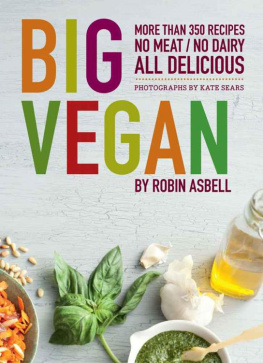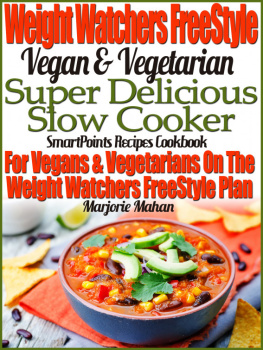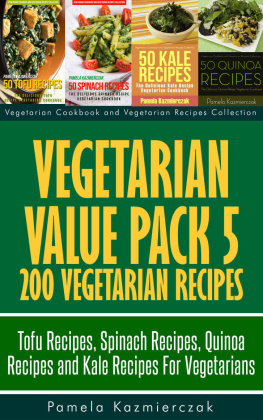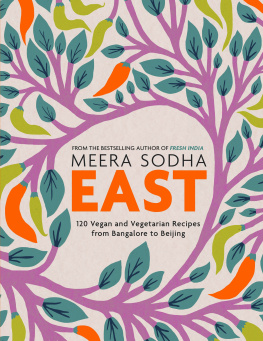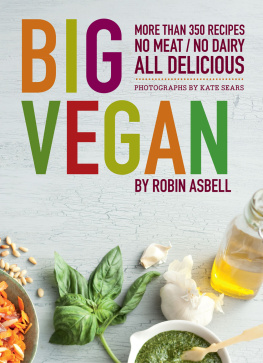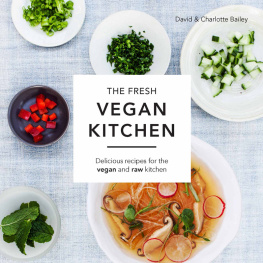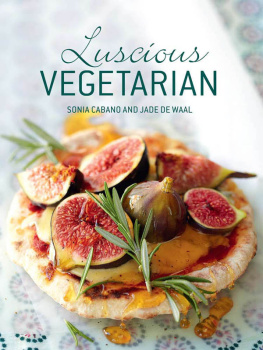New Vegetarian
New Vegetarian
More Than 75 Fresh, Contemporary Recipes For Pasta, Tagines, Curries, Soups and Stews, and Desserts

by Robin Asbell
Photographs by Yvonne Duivenvoorden

Text copyright 2009 by Robin Asbell.
Photographs copyright 2009 by Yvonne Duivenvoorden.
All rights reserved. No part of this book may be reproduced in any form without written permission from the publisher.
Library of Congress Cataloging-in-Publication Data available.
eISBN: 978-1-4521-0041-8
Prop styling by Catherine Doherty
Food styling by Lucie Richard
Sriracha Sauce is a registered trademark of V. Thai Food Product Co., Ltd; Huy Fong Foods, Inc.; Tabasco is a registered trademark of McIlhenny Co.; Thai Kitchen Curry Paste is a registered trademark of Epicurian International Inc.
Chronicle Books LLC
680 Second Street
San Francisco, CA 94107
http://www.chroniclebooks.com
Many thanks
This book was born with the unswerving support of my sweetheart, Stan, who has tasted every vegetarian recipe with me for 26 years. My family and friends have made the creative journey fun.
I want to thank Sarah Billingsley, Amy Treadwell, Peter Perez, Anne Donnard, Doug Ogan, David Hawk, and the whole creative team at Chronicle. Yvonne Duivenvoorden and the food photography crew did a wonderful job bringing the food to life.
My IACP and Greenbrier friends and colleagues all contributed to this book, in ways great and small. Special thanks to John Ash and Yukari Sakamoto for informing the umami broth recipe, and to everyone who gave me ideas and support. All my magazine editors and cooking school directors also deserve thanks, as they keep me on my toes.
To my special client family, I hope you know how much it means to me that you like the food.
TABLE OF CONTENTS
CHAPTER 1
APPETIZERS AND LIGHT MEALS
CHAPTER 2
SALADS
CHAPTER 3
SOUPS
CHAPTER 4
MAIN COURSES
CHAPTER 5
DESSERTS
Its too bad that we have to differentiate between vegetarian food and food in general, because it seems that once we call something vegetarian, or even worse, healthy, there is a large group of people who wont even try it. In this book, I share dishes that I have served to passionately omnivorous people who enjoyed them thoroughly. In fact, when these dishes were served alongside the meat dishes that my guests were certain they preferred, the plant-based specialties were devoured and raved about.
After watching the vegetarian option disappear first over and over again at gatherings I attended or catered, I was moved to put together a collection of recipes that any vegetarian can take to a feast where omnivores are present. Each savory recipe makes something that can stand in as a complete vegetarian meal, just as it canand will beshared by everyone. The desserts are vegan, but attractive and delicious enough to lure the most committed junk foodist.
A vegetarian diet is no longer uncommon in our communities. In fact, theres a good chance that someone in your family or circle of friends is a vegetarian. But if youre the only one, bringing great food and living well are probably the best ways to convince your loved ones that you are making the right food choices.
Eating a meatless diet is not new. Over the centuries, many groups of people have practiced vegetarianism, from Buddhists and Brahmans to Seventh-day Adventists. Pythagorus, Aristotle, and Leonardo da Vinci were celeb veggies, proving that you dont need meat to be smart. Of course, Hitler was a vegetarian, too, so its no guarantee.
In centuries past, a populations meat intake was usually limited by economics and the environment, and everybody ate what we would call vegetarian meals as a matter of course. Before giant factory farms kept our supermarkets and fast-food places stocked with cheap meat, folks simply had less access to it. The standard American diet is unhealthful for many reasons, not the least of which is too much factory-farmed meat.
There are many reasons for going veg. During a vegetarians lifetime, one can switch from one reason to the next and never run out. One reason that is taking on new urgency today is the environment. In 2006 the Food and Agriculture Organization of the United Nations released the report Livestocks Long Shadow, in which the global impact of raising animals for food was assessed. It turns out that livestock, and all the activities involved in the meat-making industry, produce 18 percent of the greenhouse gases emitted per yearbeating out transportation as a source of global warming.
Between 1970 and 2002, developing countries meat consumption per capita increased from 24 to 64 pounds, and in developed nations like our own, from 143 to 176 pounds. A person who eats meat is responsible for 1.5 tons more carbon dioxide per year than a vegetarian. A person following a low-fat vegetarian diet needs less than half (0.44) an acre per person per year to produce his or her food, while a typical meat eater needs 2.11 acres. This means that more forests must be cleared for raising animals, which is a leading cause of the destruction of rain forests. A vegetarian who shops locally can reduce his or her carbon footprint that much more.
Another good reason to drop meat is for the benefit of your health. Vegetarians are typically healthier than the rest of the population and avoid many of the diet-related diseases of our times. Eliminating meat cuts saturated fat and cholesterol and, almost as important, makes room for more protective foods. It may well be that plant-based foods are so loaded with good things that we live longer just by eating more veggies instead of filling up on beef. Replacing meat with beans and soy adds antioxidants and fiber and lowers cholesterol instead of raising it. Grass-fed cows and chicken produce dairy and eggs that contain the same good fats that are in fish, as well as vitamin B-12. Filling up on veggies floods your body with cancer-preventing, cleansing chemicals instead of hindering it with slowly digesting flesh foods.
Studying the effects of diet is tricky because so many factors influence disease. In the Adventist Health Study, vegetarian men had 38 percent lower rates of heart disease and lived 3.21 more years than nonvegetarian men. Vegetarian women lived 2.52 years longer. Overall, vegetarians had half the high blood pressure, diabetes, and colon cancer, and two-thirds the rheumatoid arthritis and prostate cancer. In general, folks who ate vegetarian, ate nuts regularly, exercised, and kept their weight down were the healthiest. Doctors like Dean Ornish and John McDougall have long track records of reversing heart disease and many other serious ailments with vegetarian diets. Vegetarians who also choose a lot of other healthful habitslike not smoking, not drinking in excess, exercising, and eating lots of whole grains, fruits, and veggiesgreatly improve their chances of a longer, healthier life.
Another benefit of avoiding meat products is that you avoid the growing problems with unsafe food handling. Large-scale meat production and the risks of bacterial contamination go together, and it is increasingly common for meats to be the cause of food poisoning. The possibility of diseases like mad cow and bird flu devastating this country, as they have others, is very real.
Next page


